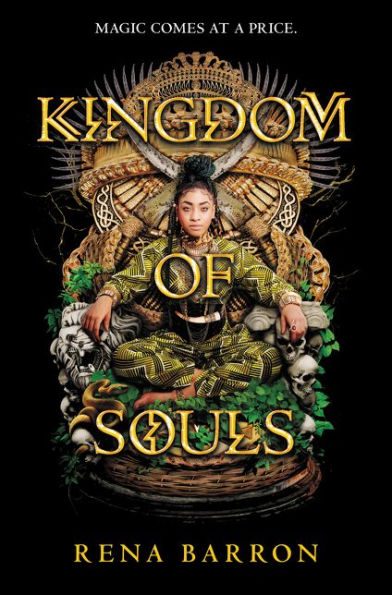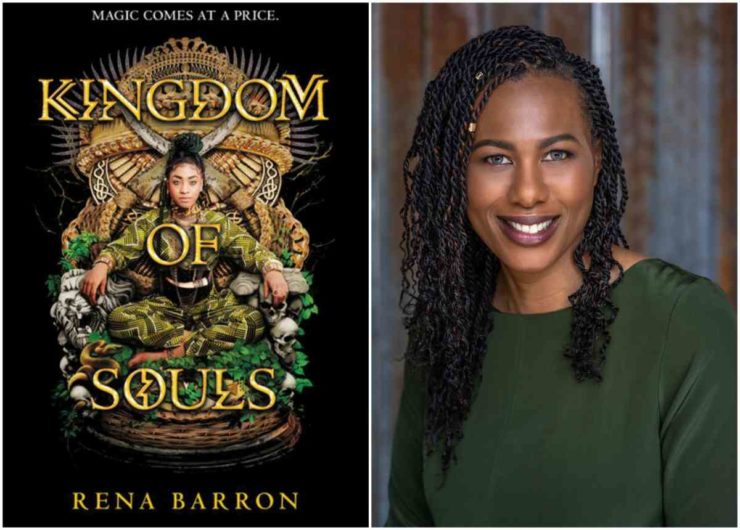The voodoo-inspired magic system of Kingdom of Souls starts on an old country road tucked behind sprawling pine trees. The seeds of the story took root there, fueled by my yearning to connect to a stolen history.
I grew up in the deep south among God-fearing black folks who went to church, prayed, and feared damnation—the type of people who passed their free time on their porches sipping cool drinks. I remembered chasing the chickens on our farm and helping my great grandfather feed the hogs. My great grandmother had a garden that did better some years than others. She raised collard greens, corn, and yellow squash among other vegetables. I wasn’t much for gardening, but I tried my hand at making mud pies.
For my part, I was always asking questions and had a vivid imagination. I liked to sit on the porch swing with my teddy bear that was as big as me. Most of the time, I eavesdropped on the adults’ conversations. And while I can’t recall the bear’s name, I remember snatches of those conversations. The white sheriff who allegedly rode around with black men in the trunk of his car for hours on the backroads. Uncle Buddy’s son, who had a longstanding grudge against my great grandfather over a disagreement.
They also talked about people in our community who could hurt you in more subtle ways than the sheriff. They could slip something in your food or drink, or fix you with a nasty curse. One jealous woman befriended a young bride and fed her a concoction that made her husband leave her. I heard snippets of stories like that from different folks. People used the terms voodoo and hoodoo interchangeably, but I had no clue what either word meant.
For a long time, I wondered how these two words existed alongside a community that was so fearful of God. Between the talk of fire and brimstone in church and this secret magic, I had plenty of nightmares. I may not have understood the words, but they had already become a part of my identity. It wasn’t until I started to explore my family’s origins that I reached a basic level of understanding. Behind these words and practice was a hidden world. One that was rich in culture, traditions, and beliefs that had shaped my ancestors. A world that I did not know existed.
When I say I draw inspiration from black magic, I don’t mean dark magic. A constant thread in the stories I heard was the wrongness around voodoo/hoodoo practice. To understand why we have to consider the profound trauma behind colonization. In Kingdom of Souls, I choose to remove that trauma and history. Magic isn’t good or bad. In the story, Heka, the father and mother of magic, has bestowed his gift upon the five tribes that worship him. Most of the tribal people bear some degree of magic, some more than others. Magic takes from all is a common tribal proverb. Even a powerful witchdoctor suffers fatigue or a weakening of the spirit after a great feat. But for those who do not receive the gift, the price is heftier. One can entice magic by offering up years off of their life in exchange for it. The trick is that magic takes of you what it will. It could take one year for a simple spell, or a decade.
For me, black magic means magic inspired by African/Black diaspora. There are some similar ideologies around nature, the ancestors, and the idea of a supreme deity across many of these traditional belief systems. Considering the rich history and the sheer size of the black population around the world, it’s no surprise that voodoo and hoodoo are only the tip of the iceberg.
While we’re on the subject of black magic, this is a good time to talk about the difference between voodoo and hoodoo. Let’s start with voodoo, which itself has many variations. To think of voodoo as monolithic would be oversimplifying a complex tradition. Voodoo in America varies from the Haitian and West African traditions. Even the spelling of the word is different to further the distinction between them. Some spellings include vodu, vodou, and vodoun.The genetic makeup is a unique compilation of beliefs from across West Africa, including traditions from Akom, Bori, Vodun, and Yoruba among others. Mix in colonization and the slave trade to stir the pot. The results: there’s no one right way to practice voodoo, yet there are commonalities, a shared core.
Buy the Book


Kingdom of Souls
Voodoo is most often closely associated with Vodun, a West African religion with a complex spiritual hierarchy of a supreme deity, lesser gods, and ancestral spirits. One must go through initiations to reach spiritual and ritual knowledge. The initiations themselves are deeply sacred ceremonies shrouded in mystery to outsiders. An example of one such initiation in the Haitian tradition is a ceremony to dedicate oneself to serving an Iwa, an intermediary to the supreme deity. Early American voodoo shared this ordered system with Vodun. Eventually, it incorporated the influences of Western religions. One could say that voodoo evolved the same way our ancestors adapted to survive.
Hoodoo, also called black folk magic, is a step further removed from African voodoo. It’s described as the ritual practice of voodoo without the religious aspects. It shares similarities in the use of talismans, rootwork, connection to nature, and spiritual possession. There is no initiation in hoodoo, and it’s often passed down through families and practiced in secrecy in the United States. Hoodoo has long been a staple in popular Blues lyrics. Take a listen to songs by Sonny Boy Williamson and Lonesome Sundown for a small sample:
One night, I’m goin’ down in Lou’siana
An buy me another mojo hand
Well, because I’ve got to break up my baby
From lovin’ this other man–“Hoodoo Hoodoo” by Sonny Boy Williamson
I ain’t got no rabbit foot, or no old bone
But when I leave you, baby, you’ll be so all alone
‘Cause I’m a mojo man, yes, I’m a mojo man
I’m gonna get my mojo workin’, win you back againI’ve been down in Alabama and down in Tennessee
I got a lot of pretty women runnin’ after me
‘Cause I’m a mojo man, yes, I’m a mojo man–“I’m a Mojo Man” by Lonesome Sundown
On the big screen, voodoo has appeared in films such as Child’s Play, Tales from the Hood, and The Skeleton Key. There’s a scene in Child’s Play when a dying Charles Lee Ray utters a few words over a doll and transfers his soul into its body. The idea behind the scene is supposedly tied to voodoo (e.g. the concept of a voodoo doll), but there is little evidence of the practice in the West African tradition. Instead, voodoo dolls have long been used as propaganda to negatively depict African and Afro-Caribbean religions in the west. Although I personally love the idea of a doll to purge my enemies, one prick at a time.
My lifelong interest in African/black magic is woven between the pages of Kingdom of Souls. Much like the practice of voodoo, the people of the tribal lands live in a structured society with a principal deity. They undergo a series of initiations in their quests to come closer in mind, body, and soul to their God. Yet, what I’ve learned so far about the traditions and beliefs of West Africa is only a small piece of a missing puzzle of my journey of self-discovery.
Further Reading
Grasping the Root of Divine Power by HRU Yuya T. Assaan-ANU (CreateSpace Independent Publishing Platform)
Hoodoo, Voodoo, and Conjure by Jeffrey F. Anderson (Greenwood Folklore Handbooks)
Black Magic: Religion and The African American Conjuring Tradition by Yvonne P. Chireau (University of California Press)
Rena Barron grew up in small-town Alabama, where stories of magic and adventure sparked her imagination. After penning her first awful poem in middle school, she graduated to writing short stories and novels by high school. Rena has an affinity for good cheese, wine, and nature. When she’s not writing, she can be found reading or brushing up on her French. Find her online @renathedreamer or at renabarron.com.










